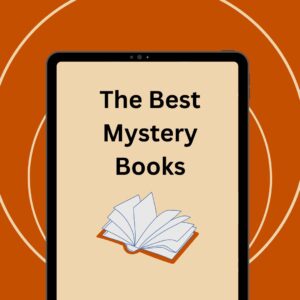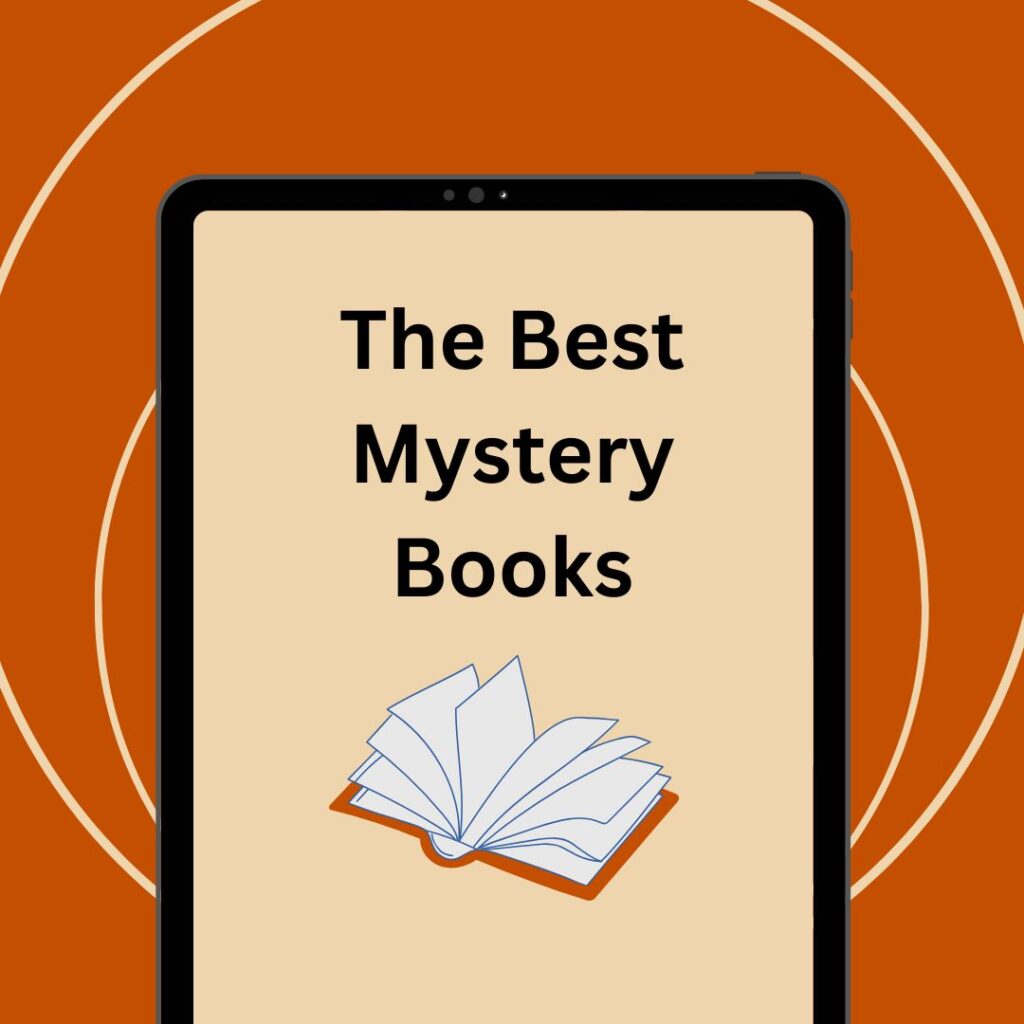The Best Mystery Books & Novels
Mystery novels have a unique ability to captivate readers, drawing them into intricate plots filled with suspense, intrigue, and unexpected twists. Whether you’re a fan of classic whodunits or contemporary thrillers, this comprehensive guide explores some of the best mystery books that have left an indelible mark on the genre. Each summary highlights the essence of the story, making it easier for you to find your next gripping read.

1. And Then There Were None by Agatha Christie
Often hailed as Agatha Christie’s masterpiece, And Then There Were None follows ten strangers invited to a remote island under false pretenses. As they gather in a mansion, they soon discover they are being hunted down one by one according to a nursery rhyme.
Key Themes:
- Isolation: The characters’ seclusion amplifies tension and paranoia.
- Justice: Each character must confront their past misdeeds.
- Psychological Suspense: The unraveling of trust among characters keeps readers guessing.
This novel is a must-read for anyone who enjoys a tightly woven plot with shocking revelations.
2. The Big Sleep by Raymond Chandler
In this hard-boiled detective novel, private investigator Philip Marlowe is hired by a wealthy general to resolve a blackmail case involving his daughter. As Marlowe digs deeper, he finds himself entangled in a web of deceit and murder.
Key Themes:
- Atmosphere and Characterization: Chandler emphasizes mood over intricate plotting.
- Moral Ambiguity: The line between right and wrong blurs as Marlowe navigates L.A.’s underbelly.
- Classic Noir Elements: The story encapsulates the essence of noir fiction with its gritty realism.
Chandler’s writing style and complex characters make this a cornerstone of mystery literature.
3. In Cold Blood by Truman Capote
This true crime novel details the brutal murder of the Clutter family in Kansas and the subsequent investigation. Capote blends journalism with literary flair, providing an in-depth look at both the victims and the killers.
Key Themes:
- Psychological Insight: Capote explores the minds of both the murderers and their victims.
- Moral Complexity: The narrative raises questions about justice and culpability.
- Nonfiction Novel Format: Capote’s unique approach blurs the lines between fact and fiction.
In Cold Blood remains a groundbreaking work that redefined the true crime genre.
4. The Maltese Falcon by Dashiell Hammett
This classic detective story follows private eye Sam Spade as he investigates the murder of his partner while searching for a priceless statuette known as the Maltese Falcon. The plot thickens with deception and betrayal from various characters.
Key Themes:
- Greed and Corruption: The quest for wealth leads to moral decay among characters.
- Hard-Boiled Style: Hammett’s terse prose captures the gritty realism of detective fiction.
- Complex Characters: Each character has hidden motives that complicate Spade’s investigation.
This novel is essential reading for fans of detective fiction and noir storytelling.
5. The Hound of the Baskervilles by Sir Arthur Conan Doyle
Sherlock Holmes returns to solve one of his most famous cases involving a legendary beast haunting the Baskerville family on the moors of Devon. As Holmes investigates, he uncovers dark family secrets intertwined with local folklore.
Key Themes:
- Rationality vs. Superstition: Holmes embodies logic in contrast to the supernatural fears surrounding him.
- Atmospheric Setting: The moors serve as a haunting backdrop that adds suspense.
- Family Legacy: The story explores how past sins affect future generations.
This iconic tale showcases Holmes at his best, combining mystery with elements of horror.
6. The Woman in White by Wilkie Collins
This Victorian sensation novel follows Walter Hartright, who encounters a mysterious woman dressed in white on his way to a new job. As he unravels her story, he becomes embroiled in a web of conspiracy and deception involving identity theft and madness.
Key Themes:
- Gothic Elements: The novel blends mystery with psychological horror.
- Social Commentary: Collins critiques societal norms regarding women during the Victorian era.
- Multiple Perspectives: The use of varied narrators adds depth to the unfolding mystery.
The Woman in White is celebrated for its intricate plot and rich characterizations.
7. The Dry by Jane Harper
Federal agent Aaron Falk returns to his drought-stricken hometown for his best friend’s funeral, only to uncover dark secrets tied to their past. As he investigates, Falk grapples with unresolved issues from his youth while seeking justice for his friend.
Key Themes:
- Atmospheric Tension: The oppressive heat mirrors emotional turmoil.
- Secrets from the Past: Falk’s investigation reveals buried truths that impact multiple lives.
- Small-Town Dynamics: Harper explores how community ties can both support and suffocate individuals.
This debut novel has garnered acclaim for its compelling narrative and vivid setting.
8. My Sister, the Serial Killer by Oyinkan Braithwaite
This darkly comedic novel follows Korede, whose sister Ayoola has a habit of killing her boyfriends. When Ayoola targets Korede’s love interest, Korede must decide whether to protect her sister or do what’s right.
Key Themes:
- Family Loyalty vs. Morality: Korede grapples with her loyalty to Ayoola against her moral compass.
- Cultural Contexts: Set in Nigeria, it offers insights into societal expectations around gender and family.
- Dark Humor: Braithwaite’s wit adds levity to serious themes while maintaining suspense.
This unique blend of humor and horror makes it an engaging read that challenges conventional narratives.
9. The Shadow of the Wind by Carlos Ruiz Zafón
Set in post-war Barcelona, this literary mystery follows Daniel Sempere as he discovers a forgotten book by author Julián Carax. As Daniel seeks out Carax’s other works, he uncovers dark secrets tied to both Carax’s life and his own family’s history.
Key Themes:
- Books as Mysteries: The narrative intertwines literature with intrigue, making it a love letter to books themselves.
- Historical Contexts: Zafón captures the atmosphere of Barcelona during turbulent times.
- Interconnected Stories: Multiple narratives converge around Daniel’s quest for truth.
This atmospheric tale is celebrated for its lyrical prose and rich storytelling.
10. The Girl with the Dragon Tattoo by Stieg Larsson
Journalist Mikael Blomkvist teams up with hacker Lisbeth Salander to investigate the decades-old disappearance of wealthy industrialist Henrik Vanger’s niece. Their investigation reveals deep-seated corruption within Vanger’s family.
Key Themes:
- Complex Characters: Salander’s troubled past adds depth to her role as an unconventional heroine.
- Social Critique: Larsson addresses issues like misogyny and corporate greed throughout the narrative.
- Intricate Plotting: The intertwining mysteries keep readers engaged until the very end.
This international bestseller is renowned for its gripping narrative and multifaceted characters.
Frequently Asked Questions (FAQs) About Mystery Books
1. What defines a mystery book?
A mystery book is a genre of fiction that revolves around the solution of a crime or the unraveling of a puzzle. The plot typically involves a detective or amateur sleuth investigating a situation, often leading to suspenseful twists and turns.
2. What are the different subgenres of mystery books?
Mystery books can be categorized into several subgenres, including:
- Cozy Mysteries: Light-hearted stories often set in small towns with amateur sleuths.
- Hard-Boiled Mysteries: Gritty narratives featuring tough detectives and moral ambiguity.
- Police Procedurals: Focus on law enforcement investigations and the procedures involved.
- Psychological Thrillers: Emphasize the psychological aspects of crime and suspense.
- Historical Mysteries: Set in specific historical periods, blending mystery with historical context.
3. Who are some famous authors in the mystery genre?
Notable authors include:
- Agatha Christie: Known for her iconic characters Hercule Poirot and Miss Marple.
- Arthur Conan Doyle: Creator of Sherlock Holmes, one of literature’s most famous detectives.
- Raymond Chandler: Renowned for his hard-boiled detective novels featuring Philip Marlowe.
- Gillian Flynn: Author of psychological thrillers like Gone Girl.
4. Are mystery books suitable for all ages?
Mystery books come in various styles and tones, making them suitable for different age groups. While some are appropriate for young readers, others may contain mature themes and content. Always check age recommendations or reviews to ensure suitability.
5. How do I choose a good mystery book?
To find a good mystery book, consider:
- Personal Preferences: Think about whether you prefer cozy mysteries, thrillers, or classic whodunits.
- Author Reputation: Look for well-reviewed authors known for their engaging plots.
- Recommendations: Check online reviews, book blogs, or ask friends for suggestions.
- Sample Chapters: Read excerpts to see if the writing style resonates with you.
6. What makes a mystery book compelling?
A compelling mystery book typically features:
- Intriguing Plot: A well-crafted story with unexpected twists keeps readers engaged.
- Complex Characters: Multi-dimensional characters add depth and relatability to the narrative.
- Atmospheric Setting: A vivid setting enhances the mood and immerses readers in the story.
- Pacing and Tension: Effective pacing builds suspense and keeps readers turning pages.
7. Can I find diverse voices in mystery literature?
Absolutely! The mystery genre has seen an increase in diverse voices, with authors from various backgrounds exploring different cultures, perspectives, and experiences. Look for works by authors such as:
- Attica Locke
- S.A. Cosby
- Renee Patrick
8. Do mystery novels always have a resolution?
Most mystery novels aim to resolve the central conflict by revealing the culprit or solving the puzzle by the end. However, some may leave certain elements open-ended or ambiguous to provoke thought or discussion.
9. How have mystery novels evolved over time?
Mystery novels have evolved significantly since their inception, adapting to societal changes and reader preferences. Early works focused on amateur sleuths and locked-room mysteries, while contemporary novels often incorporate psychological elements, social issues, and complex character dynamics.
10. Are there any popular adaptations of mystery novels?
Yes! Many popular mystery novels have been adapted into films and television series. Some notable adaptations include:
- Murder on the Orient Express (Agatha Christie)
- Sherlock Holmes (Arthur Conan Doyle)
- Big Little Lies (Liane Moriarty)
These adaptations often bring new audiences to the original works while offering fresh interpretations of beloved stories.
Conclusion
Mystery novels offer an exhilarating escape into worlds filled with suspense, intrigue, and unexpected twists. From Agatha Christie’s timeless classics to contemporary thrillers like My Sister, the Serial Killer, these stories captivate readers with their complex plots and rich characterizations. Whether you’re seeking psychological depth or fast-paced action, this list provides an array of options that promise to keep you on the edge of your seat. Dive into these remarkable tales today—your next thrilling adventure awaits!
Discover marketing services, interviews & publishing tools at SharingStories.




